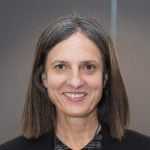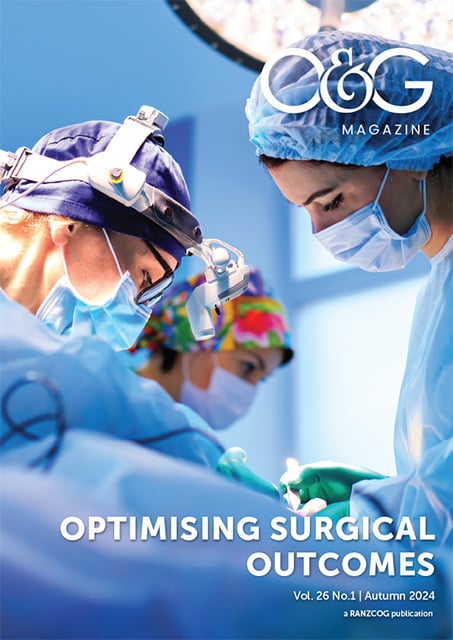This feature sees Kirsten Black in conversation with women’s health leaders in a broad range of leadership positions. We hope you find this an interesting and inspiring read.
Clinical Associate Professor Paddy Moore AM is a consultant obstetrician-gynaecologist at the Royal Women’s Hospital in Melbourne. Previously a generalist obstetrician gynaecologist with a special interest in paediatric and adolescent issues, Paddy is now the lead clinician in the Abortion and Contraception service at The Royal Women’s Hospital in Melbourne, Victoria.
Over the past 11 years she’s led the hospital’s expansion of its abortion service to provide later second trimester surgical and medical abortion. The service plays a key role in supporting clinicians across Victoria providing abortion and training the next generation of abortion providers. The Women’s was the first site to offer the RANZCOG Advanced Training Modules and the Advanced Training Pathway in Contraception, Abortion and Sexual Health.
Here, Paddy talks to Kirsten Black, Professor of Sexual and Reproductive Health at the University of Sydney and Chair of RANZCOG’s Sexual and Reproductive Health Committee.
Paddy, tell me what influenced you to become an abortion provider?
As a medical student I was always interested in a career in women’s reproductive health and was drawn to obstetrics and gynaecology as a pathway. I assumed that contraception and abortion would be an integral part of the clinical work but while training in New Zealand, the UK and Australia I realised that many of my contemporaries did not see sexual and reproductive health as an important area to understand or develop skills in. To me however, it was apparent that the most vulnerable patients had very limited access to sexual and reproductive health services, and I increasingly appreciated that reproductive choice was key to improving health outcomes for women and their families.
Nevertheless, for much of my career there was nowhere to refer the most vulnerable patients as most services were privatised and geographically very concentrated in the metropolitan areas. I sought out nursing and medical colleagues who were involved in this work and became aware that a palpable stigma existed within the profession towards abortion care and those who were involved in the services. After some professional counselling and deep reflection, I decided that abortion care was an area I wished to focus on, but I never envisaged I would be a managing the largest public service in Australia, or that advocacy and service provision would take up an increasing portion of my time.
Who inspired you to work in this field?
Over time I was very affected and impressed by the work of some of my senior colleagues to advocate for reproductive rights. I observed how they were able to articulate this to political power and use their positions to bring about positive change. Observing Caroline De Costa, Margaret Sparrow, and others making early medical abortion possible in Australasia thanks to their gracious determination and creativity, was a time when I started to feel that I should become more actively involved in abortion care. Following decades of advocacy, abortion was decriminalised In Victoria in 2008, which led to waves of similar legislative changes across the country. It became apparent however that equitable access to services was not a guaranteed outcome of legislation change, and I realised I wanted to pivot my work towards improving sexual and reproductive health access. So, I sought out additional surgical training and travelled to other centres internationally to understand how they ran their abortion services.
Why do we need people skilled in second trimester abortion?
Although most abortions, about 80-90%, occur before 12 weeks, there are many reasons women and people need access to abortion after this time period. This includes contraceptive failure, delayed diagnosis of pregnancy, difficulty obtaining services, as well as a myriad of social factors. Advances in antenatal diagnosis of foetal abnormalities also mean that there is more information available to guide people in their understanding about how a condition can impact on the life of the unborn child, and the risks and benefits of continuing a pregnancy. Trained providers of surgical and medical abortion beyond the first trimester need to feel supported in their choice to provide these services and have a peer group of colleagues.
How do people react to your job?
Well, it can be a conversation starter or lead to an awkward silence! Early on in my career, I was more apprehensive about how people would react to hearing that I was an abortion provider; and in my personal life, I protected my family members from this until I felt they were able to make their own judgements about my choice of work. In terms of my colleagues, I think of my older colleagues and my direct peers; some choose not to acknowledge my area of work at all. I have several close obstetrician/gynaecologist friends who do not support my work and advocacy in this area, and many have a conscientious objection to personally providing abortion care. We have managed to successfully negotiate our friendships by respecting each other’s philosophy. They now understand that I feel consciously obligated to provide a service that is both legal and desired by most of the community. There does seem to be growing interest and acceptance of abortion care as a core part of comprehensive women’s health. In the last five years, I have been approached by an increasing number of established obstetrician/gynaecologists requesting training in second trimester surgical skills, as they feel they should be able to provide this but did not receive exposure in their training. In my experience, younger colleagues are much less likely to have any concerns about providing abortion care and actively seek out rotations in our service.
Can you describe the training pathways you have set up and what the outcomes have been?
RANZCOG has become increasingly supportive of the work of the Sexual and Reproductive Health Committee and its work in advocacy and curriculum development. Professor Michael Permezel supported Kirsten Black to establish the Sexual and Reproductive Health Special Interest Group in 2013 and the subsequent presidents along with Vase Jovanoska and Stephen White have championed this field within the college. As legislative change occurred across Australia and Aotearoa in line with community expectation, it was recognised that training a sustainable work force was essential. RANZCOG approved an Advanced Training Module (ATM) in Sexual and Reproductive Health. Specifically designed for fifth/sixth year trainees, which can be completed full-time in six months or part-time over 12 months. These modules expose the trainees to the breadth and depth of clinical and surgical skills in contraception and abortion care and are designed for clinicians who wish to embed such services within their professional scope of practice. To date, we have trained 14 senior registrars and the majority of these have continued to provide these services as consultants. Four of the trainees that completed the ATM are now developing services in other hospitals and states. We hope that other institutions will develop a similar training program for their trainees.
From 2024, RANZCOG is offering Sexual and Reproductive Health as one of the fellowship pathways. This pathway involves the completion of four mandatory modules in abortion, contraception, sexual health and essential obstetrics and gynaecology, as well as two elective modules (selecting from menopause, care of vulvovaginal conditions, acute gynaecology and early pregnancy, colposcopy, paediatric and adolescent gynaecology, and sexual health.
Describe your leadership style?
I aspire to be collaborative and reflective and try to involve staff and colleagues as much as possible in the decisions that shape the service. I also seek out allies to support/advocate for our work, both within the hospital and with external providers. Sexual and Reproductive Health (SRH) is a field that lends itself easily to collaborations across the medical nursing and counselling disciplines and much can be learnt from working in multidisciplinary teams. I have undertaken professional leadership supervision to guide me in negotiating sometimes complex issues. I’ve found this dedicated time to reflect on situations and workshop strategies to best manage the various challenges of leadership really helpful in my role. I can’t recommend this practice highly enough and I really think it has enabled me to stay positive and strategic.
What advice would you give trainees and consultants thinking about working in abortion care?
If you interested in a career in SRH, talk to current providers and seek out a clinical placement, or consider a sabbatical that would enable you the time and space to upskill. I recommend reading about SRH and rights to better understand the past and current political and health landscape. I suggest you check out the college training pathways and resources, as well as attend meetings and conferences to familiarise yourself with the field. I offer much encouragement to pursing work in abortion care. I have found it incredibly intellectually stimulating and personally rewarding.







Leave a Reply